As the summer heats up, the need for effective, energy-efficient air conditioning options has never been more crucial. With rising energy costs and increased environmental concerns, selecting the best air conditioner not only keeps you cool but also significantly lowers your energy bill and minimizes your carbon footprint. With an emphasis on energy efficiency, I’ve researched and rounded up the top seven energy-efficient air conditioners that will be essential in 2024, ensuring your cooling system meets both cost-saving and environmental goals.
Key Takeaways
- Energy-efficient air conditioning options can significantly reduce your energy bill and minimize environmental impact.
- Understanding the Seasonal Energy Efficiency Ratio (SEER) can help you make informed decisions on the best air conditioner for your home.
- Considering your home’s unique needs and characteristics will help you select the most efficient HVAC system.
- Investing in an Energy Star-certified air conditioner and properly sized unit will optimize energy savings.
- Exploring advanced technologies, such as variable-speed compressors and geothermal cooling, can enhance your home’s energy efficiency even further.
7 Top Energy-Efficient Air Conditioning Solutions
Here’s a guide on 7 Best Energy Efficient Air Conditioning Options To Stay Cool in 2024:
- Smart Air Conditioners
- These AC units can be controlled via smartphones or AI assistants, offering convenient scheduling features to optimize cooling and reduce energy use. A notable model is the EcoCool Smart AC, which reduces energy consumption by 40% compared to traditional models.
- Inverter Air Conditioners
- Inverter technology allows the compressor to operate at variable speeds, ensuring efficient energy use. The GreenTech Inverter AC, for instance, saves up to 50% more energy than non-inverter models.
- Solar-Powered Air Conditioners
- These units use solar energy to power the cooling system, significantly reducing electricity costs. SolarBreeze AC can harness up to 75% of its energy from solar panels, making it a highly sustainable option.
- Geothermal Cooling Systems
- Utilizing the stable underground temperature to cool homes, these systems are incredibly efficient for large spaces. EarthCool Systems offer up to 60% energy savings compared to conventional air conditioners.
- Window Film or Reflective Coatings
- Applying these to windows can reduce solar heat gain, lessening the load on your air conditioner. SunShield Window Coating reflects about 70% of the sun’s rays, reducing the need for constant air conditioning.
- Portable Air Conditioners with Energy-Saving Modes
- Ideal for small spaces or temporary cooling needs, these portable units often come with energy-saving modes. The CompactCool Portable AC, for instance, has an Eco Mode that uses 30% less energy than standard settings.
- Evaporative Coolers (Swamp Coolers)
- Best for dry climates, they use the natural evaporation process for cooling. The DesertAir Evaporative Cooler consumes approximately 25% of the energy of a traditional air conditioner, making it a cost-effective choice for arid regions.
Each of these options offers a unique approach to energy-efficient cooling, ensuring comfort while also being mindful of energy consumption and environmental impact in 2024.
The Rise of Smart Air Conditioners
Smart air conditioners have surged in popularity, primarily due to their advanced features that offer both energy savings and convenience. They are becoming a popular choice among homeowners looking for energy-efficient air conditioning options. A hallmark of a smart air conditioner is its built-in Wi-Fi radio, enabling you to remotely control and schedule your AC system through a simple app using your smartphone.
This section will delve into what defines a smart air conditioner, how to integrate it with your existing home automation system, and the benefits of app control and remote accessibility.
What Defines a Smart Air Conditioner?
A smart air conditioner goes beyond the traditional cooling system with its intelligent cooling features. Some of the unique aspects include:
- Home automation compatibility
- App control for remote accessibility
- Wi-Fi radio for connectivity
- Voice commands enabled through platforms like Alexa and Google Assistant
- Customizable cooling schedule
- Energy usage reports
- IFTTT support for automation routines
- Location services for temperature adjustment based on your presence
- Energy Star certified for efficient energy usage
These exceptional features can be found in various smart air conditioner types, such as window units and portable models, providing you with more choices when looking for the perfect AC system for your home.
Integrating Smart ACs into Your Home Automation
One of the significant advantages of smart air conditioners is how easily they can be integrated with your existing home automation system. By connecting your AC to platforms like Amazon Alexa or Google Assistant, you can control your air conditioner using voice commands.
Furthermore, with IFTTT support, you can create automation routines that adjust your AC settings based on triggers from other connected devices. Additionally, most smart air conditioners are compatible with popular smart home hubs, making it easier to control all your connected devices through a single platform.
App Control and Remote Accessibility
Remote accessibility is a game-changer in managing your home’s environment. With a smart air conditioner, you can use your smartphone as a remote control, enabling you to adjust your AC settings even when you’re not at home.
You can pre-cool your living space before you arrive or change the cooling schedule in case your plans change. By having this level of control over your air conditioning system, you can ensure maximum energy efficiency and optimal comfort in your home.
Understanding BTUs and AC Efficiency
When choosing energy-efficient air conditioning options, it’s essential to understand the importance of BTUs, or British Thermal Units. The BTU rating of an air conditioner not only relates to its cooling power but also its energy efficiency in cooling a specific square footage. Selecting an AC unit with the correct BTU level for the intended space ensures that it won’t overwork to achieve the desired coolness, thus saving energy and extending the life of the unit.
Oversizing an air conditioning unit can lead to inefficiency, as it may cool the space too quickly without properly dehumidifying. In contrast, an underpowered unit with too few BTUs may continuously run, consuming more energy without adequately cooling the space.
The key is to find an air conditioner with a BTU rating corresponding to your room’s square footage and conditions, including humidity control and energy efficiency. To help you make an informed decision, consider the following table which displays the recommended BTU levels for different room sizes:
| Room Size (square feet) | Recommended BTU |
|---|---|
| 100 to 150 | 5,000 |
| 150 to 250 | 6,000 |
| 250 to 300 | 7,000 |
| 300 to 350 | 8,000 |
| 350 to 400 | 9,000 |
| 400 to 450 | 10,000 |
| 450 to 550 | 12,000 |
Moreover, always pay attention to energy efficiency ratings on air conditioning units. Look for Energy Star rated systems and choose a unit that provides adequate cooling power with minimal energy consumption. By understanding BTUs and air conditioner efficiency, you can make a more informed decision when selecting energy-efficient air conditioning options.
Comparing Portable vs. Window Air Conditioning Units
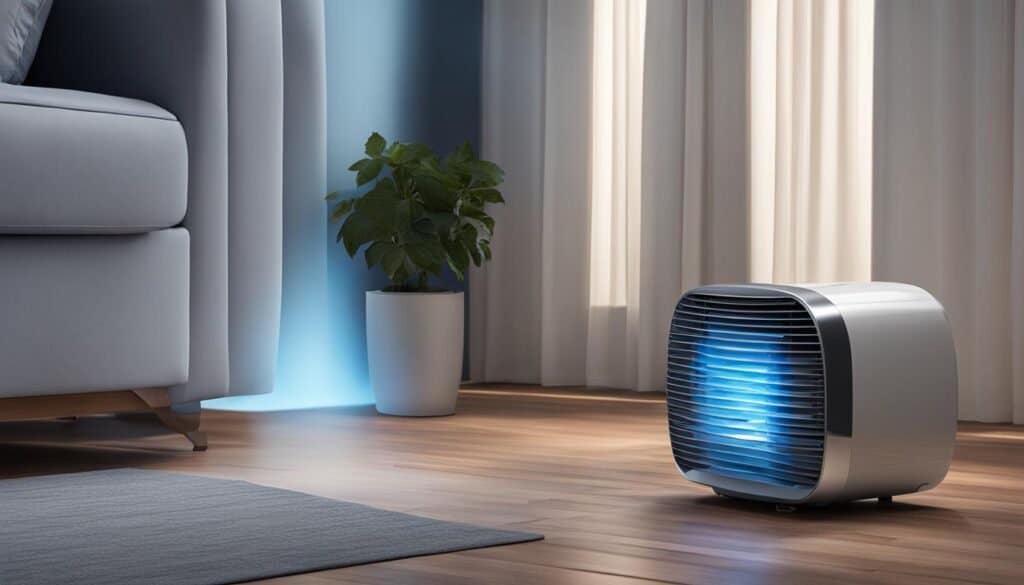
When you’re in the market for a new air conditioner, it’s essential to weigh the advantages and disadvantages of portable and window units. Each type offers unique benefits and drawbacks that can impact your decision. Energy efficiency, installation ease, and cool air delivery are crucial factors in making the right choice.
Advantages and Disadvantages of Portable ACs
Portable air conditioners provide mobility, allowing you to move them to different rooms as needed. They are often easier to install and well-suited for areas where window units are not practical. However, due to their design, portable ACs may require a long exhaust tube and tend to use more floor space than window units. Furthermore, their energy efficiency might not be as high as window air conditioners due to the exhaust tube’s potential heat exchange with the room’s air.
Window Air Conditioners: Pros and Cons
Window air conditioners, on the other hand, do not take up interior space and can blend in more seamlessly with your décor. However, the installation process can be more challenging, as it requires fitting the unit into the window opening and securing it properly. Window AC units also may not be suitable for all window types and sizes, limiting their versatility.
Installation Considerations for Maximum Efficiency
To ensure maximum energy efficiency, it is crucial to choose an air conditioner that fits your space’s needs. Look for Energy Star-certified models that date their performance in terms of energy efficiency. Proper installation guidelines should be followed for both portable and window units to guarantee energy savings and cool air delivery. Having your air conditioning unit professionally installed can help you avoid any errors impacting its performance and efficiency.
Both portable and window air conditioning units have their pros and cons. Carefully considering your specific needs, available space, energy efficiency requirements, and installation process can guide you in making an informed decision about which unit is the best fit for your home.
Energy-Efficient Air Conditioning Options for Your Space
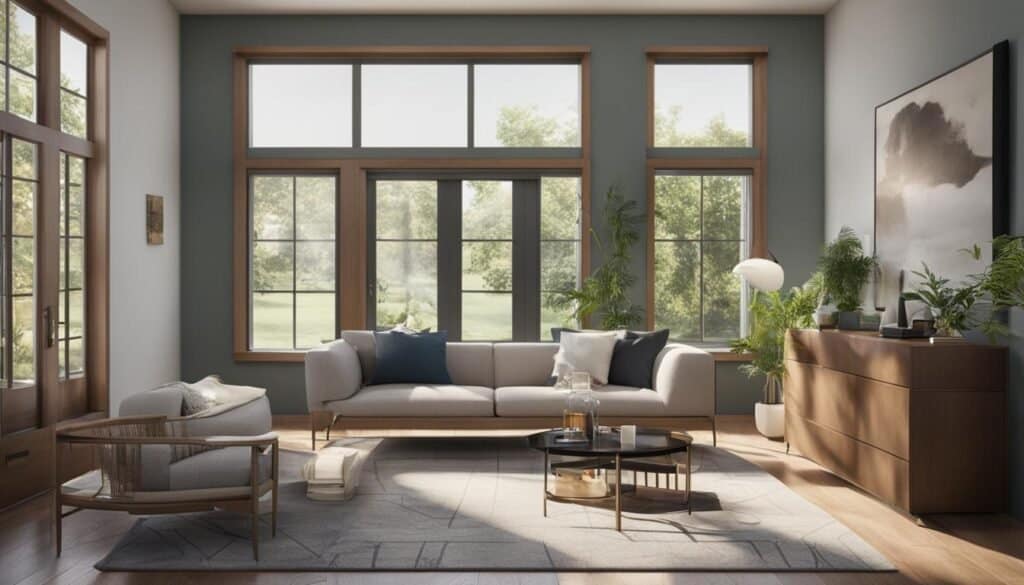
Selecting an energy-efficient air conditioning unit specifically tailored to your room can make a significant difference, not only in maintaining a comfortable temperature but also in reducing energy consumption. By considering the unique needs of each space, it’s possible to optimize the effectiveness of your AC system while keeping costs and environmental impact low.
Factors to Consider for Room-Specific AC Units
When shopping for a room-specific AC unit, don’t forget to consider the size of the space, ceiling height, window sizes, and level of sun exposure. These factors play a crucial role in properly sizing your air conditioner for optimal performance and efficiency. Moreover, energy-efficient AC units with lower Global Warming Potential refrigerants should also be taken into account, as they lessen the environmental harm if released.
Sizing Up the Right AC for Your Room
Understanding the relationship between square footage and cooling capacity enables you to choose an air conditioner with the correct cooling capacity for your room. This sizing process guarantees that your AC unit will efficiently cool your space without excessive energy consumption.
Units equipped with variable speed technology offer an extra level of efficiency by adjusting the speed of the internal compressor motor as needed. This feature further refines temperature control and enhances energy savings, ensuring that your unit operates as efficiently as possible throughout its lifespan.
To assist you in accurately sizing the air conditioner for your room and selecting an energy-efficient model, I’ve compiled a table below that outlines the appropriate cooling capacity based on the square footage of your space.
| Square Footage | Cooling Capacity (BTU) |
|---|---|
| 100-150 sq. ft. | 5,000 BTU |
| 150-250 sq. ft. | 6,000 BTU |
| 250-300 sq. ft. | 7,000 BTU |
| 300-350 sq. ft. | 8,000 BTU |
| 350-400 sq. ft. | 9,000 BTU |
| 400-450 sq. ft. | 10,000 BTU |
| 450-550 sq. ft. | 12,000 BTU |
| 550-700 sq. ft. | 14,000 BTU |
| 700-1,000 sq. ft. | 18,000 BTU |
| 1,000-1,200 sq. ft. | 21,000 BTU |
By carefully considering the factors listed above and properly sizing your air conditioner, you can ensure that your room stays cool while maximizing energy efficiency and minimizing costs.
Advanced Cooling Technologies and Inverter ACs
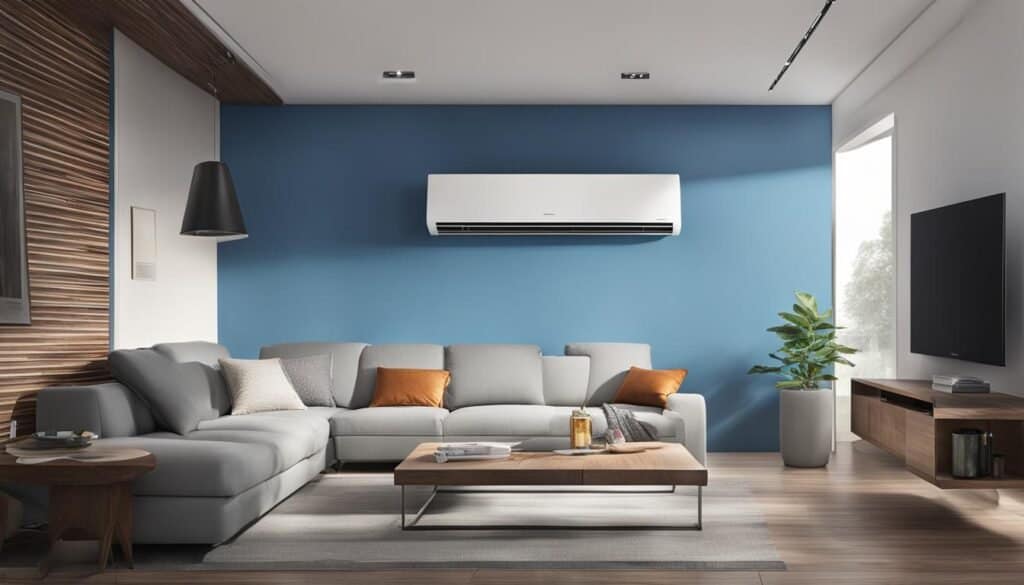
As energy efficiency remains a top priority for homeowners, inverter ACs have emerged as a popular choice due to their utilization of advanced cooling technologies. Traditional air conditioners operate by toggling between off and maximum capacity, which can lead to inefficient energy usage. In contrast, inverter technology employed by modern room air conditioners utilizes variable speed compressors, allowing for improved temperature regulation and overall cooling performance.
This precision in temperature control, coupled with the compressor’s ability to adjust its speed based on cooling demand, translates not only to a more comfortable living environment but also to less energy consumption. As a result, investing in an inverter air conditioner can have a significant impact on both power bills and environmental footprint, making it a smart choice for those seeking energy-efficient air conditioning options.
Key advantages of inverter ACs include:
- Enhanced temperature regulation
- Reduced energy use
- Increased cost savings
Indeed, inverter ACs have been notably successful in delivering on their energy-saving promise. To illustrate its superiority in energy efficiency, let’s compare the power consumption of a traditional air conditioner with that of an inverter AC under similar conditions:
| Air Conditioner Type | Power Consumption (kWh) |
|---|---|
| Traditional Air Conditioner | 5.0 |
| Inverter Air Conditioner | 3.0 |
As the table demonstrates, the inverter AC consumes considerably less power than its traditional counterpart, reinforcing its status as an energy-efficient solution for home cooling. As we continue to prioritize sustainability and cost-effectiveness, it’s clear that inverter ACs represent a significant leap forward in residential cooling technology and a wise investment for homeowners seeking to lower their energy bills while maintaining comfort.
Cutting Costs with Geothermal Heating and Cooling

While conventional air conditioning methods can be effective, geothermal heating and cooling systems offer even more significant benefits in terms of energy savings and reduced environmental impact. Despite their higher initial costs, geothermal systems provide considerable long-term savings by taking advantage of stable ground temperatures. In this section, we will explore the science behind geothermal cooling systems and how they can lead to substantial financial benefits.
The Science Behind Geothermal Cooling Systems
Geothermal systems work by circulating fluid through long, buried tubes, which exchange heat with the earth. The stable ground temperature allows these systems to operate more efficiently than traditional HVAC systems, reducing electricity usage by approximately 25% to 50%. The initial installation costs do include the expense of digging and installing the tubes, but the long-term benefits cannot be overstated.
Calculating the Long-Term Savings
When considering the potential savings offered by geothermal heating and cooling, it’s essential to look at both the immediate energy savings and the ongoing reduced operating costs. Energy Star-rated geothermal heat pump systems are eligible for federal tax credits, which can help offset the initial investment. Additionally, lower utility bills typically result from the significant electricity reduction, allowing consumers to recoup their expenses more quickly and enjoy ongoing energy efficiency.
Ultimately, investing in a geothermal system is not just an environmentally responsible choice but also a financially prudent one. The energy-efficient performance and long-term savings make geothermal heating and cooling systems an attractive option for those looking for sustainable, affordable, and efficient air conditioning solutions.
Conclusion on Energy-Efficient Air Conditioning Options
As we strive to stay cool and promote eco-friendliness, a variety of energy-efficient air conditioning options have emerged in the market. Ranging from smart air conditioners to geothermal cooling systems, these technologies not only save you money but also help in reducing your environmental impact. By grasping the importance of BTUs, carefully choosing between portable air conditioner and window unit, and seeking Energy Star-certified products, you’ll be well-equipped to decide on the best cooling solution for your space.
As you explore alternatives such as variable speed technology in inverter ACs and geothermal cooling systems, you can find the most efficient means of controlling your indoor climate while minimizing energy consumption. By considering these advanced cooling systems, you’ll pave the way for an energy-saving and environmentally friendly HVAC setup in your home.
In conclusion, whether you’re upgrading your existing cooling system or installing a new one, the options available in 2024 are increasingly diverse and efficient. By making well-informed decisions, you can keep your home cool in the most energy-efficient way, contributing to a brighter and greener future for all.
FAQ on Energy Efficient Type of Air Conditioner
Q: What is the best energy-efficient air conditioner to keep my home cool in 2024?
A: The best energy-efficient air conditioner to cool your home may vary based on your cooling needs and home size. However, the top options are usually ductless mini-split air conditioners, central air conditioners, and high-efficiency window AC units. These types of air conditioners are known to offer the best comfort while using less energy thus making them energy efficient.
Q: How is the energy efficiency of an air conditioning system measured?
A: The energy efficiency of an air conditioning system is often measured through the Seasonal Energy Efficiency Ratio (SEER). It calculates the cooling output during a typical cooling-season divided by the total electric energy input during the same period. Higher SEER ratings mean greater energy efficiency, making such air systems more cost-effective and better for the environment.
Q: What are the benefits of a central air conditioning system in terms of energy efficiency?
A: A central air conditioning system can be more energy-efficient than having individual units in each room, especially if you’re trying to cool your entire home. They provide a consistent temperature and when maintained properly, can use less energy. Central air conditioning systems also come with a higher Seasonal Energy Efficiency Ratio (SEER) hence they are known as efficient air conditioners.
Q: Why are mini-split air conditioning systems considered energy efficient?
A: Mini-split air conditioning systems are considered energy efficient because they cool only the areas you want, reducing the amount of energy used to cool unnecessary spaces. They also avoid energy losses associated with ductwork in central air systems, making a ductless system more efficient and an effective way to keep your home cool.
Q: What makes a portable air conditioner a good option for energy efficiency?
A: A portable air conditioner can be a good option for energy efficiency because it can be moved to only cool the areas in use. Therefore, instead of using a larger amount of energy to cool an entire home, like a standard air conditioner, a portable unit will cool only where necessary, using less energy and making it an efficient way to cool your home.
Q: How does an HVAC system contribute to the energy efficiency of my home?
A: An energy-efficient HVAC system offers both heating and cooling functions. Instead of relying on separate systems to heat your home and keep your home cool, using a comprehensive HVAC system can save you energy and contribute to a more efficient home overall.
Q: How do I choose the best air conditioner for energy efficiency?
A: When choosing the best air conditioner for energy efficiency, consider the energy rating or SEER rating, the size of the unit in relation to the space you need to cool, and additional energy-saving features such as programmable thermostats. Also, keep in mind that while some units may be more expensive initially, they may save you money in the long term by reducing your energy usage.
Q: Do window AC units offer good energy efficiency?
A: High-efficiency window AC units can offer good energy efficiency as they are designed to cool a specific zone, not an entire home, using less energy. More advanced models also offer features like programmable timers and energy-saving modes to help reduce energy consumption even more. It’s important to purchase a window AC unit with the right BTU capacity for your space for the best energy efficiency.
Q: Is it more energy efficient to use one central air conditioning system to cool your home or multiple window AC units?
A: Generally, using one central air conditioning system to cool your home is more energy efficient compared to using multiple window AC units. A central air conditioner tends to have a higher SEER rating which indicates more efficiency, and it eliminates the need for potentially less efficient individual units in each room. However, if only a few rooms in your home need cooling, window AC units might be a more efficient choice.
Q: Can a ductless mini-split air conditioning system effectively cool my entire home?
A: Yes, a ductless mini-split air conditioning system can effectively cool your entire home. The key is to install enough indoor units in the necessary zones in your home. Although it may be a higher initial investment, its energy efficiency and the ability to only cool areas in use makes it a cost-effective choice in the long run.

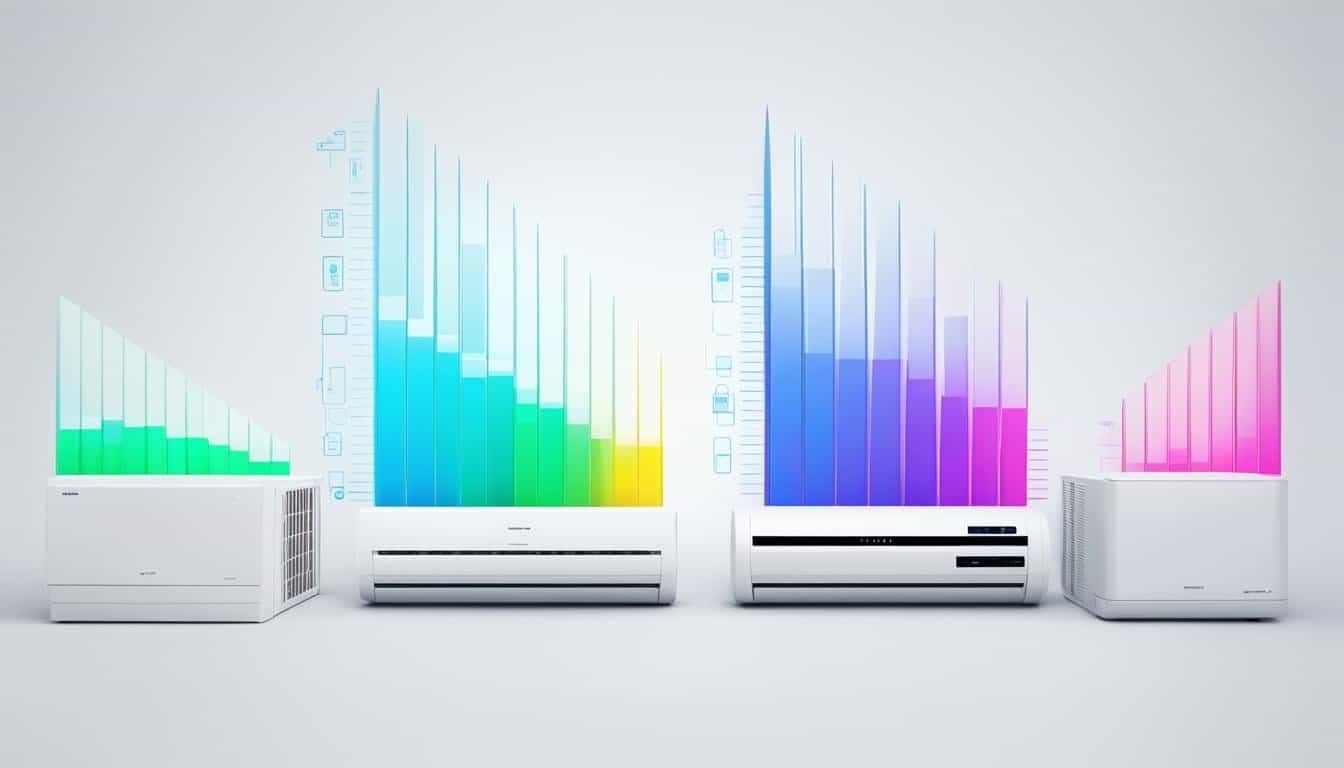
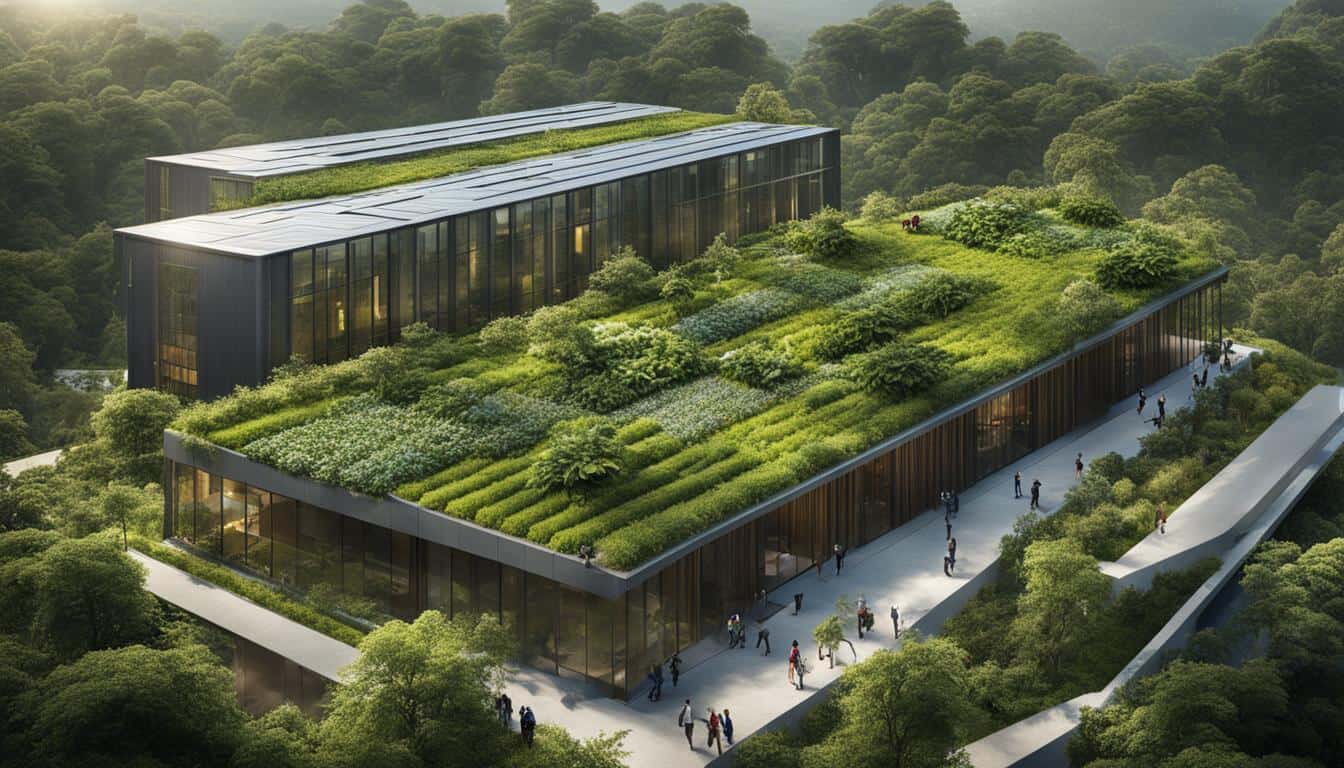

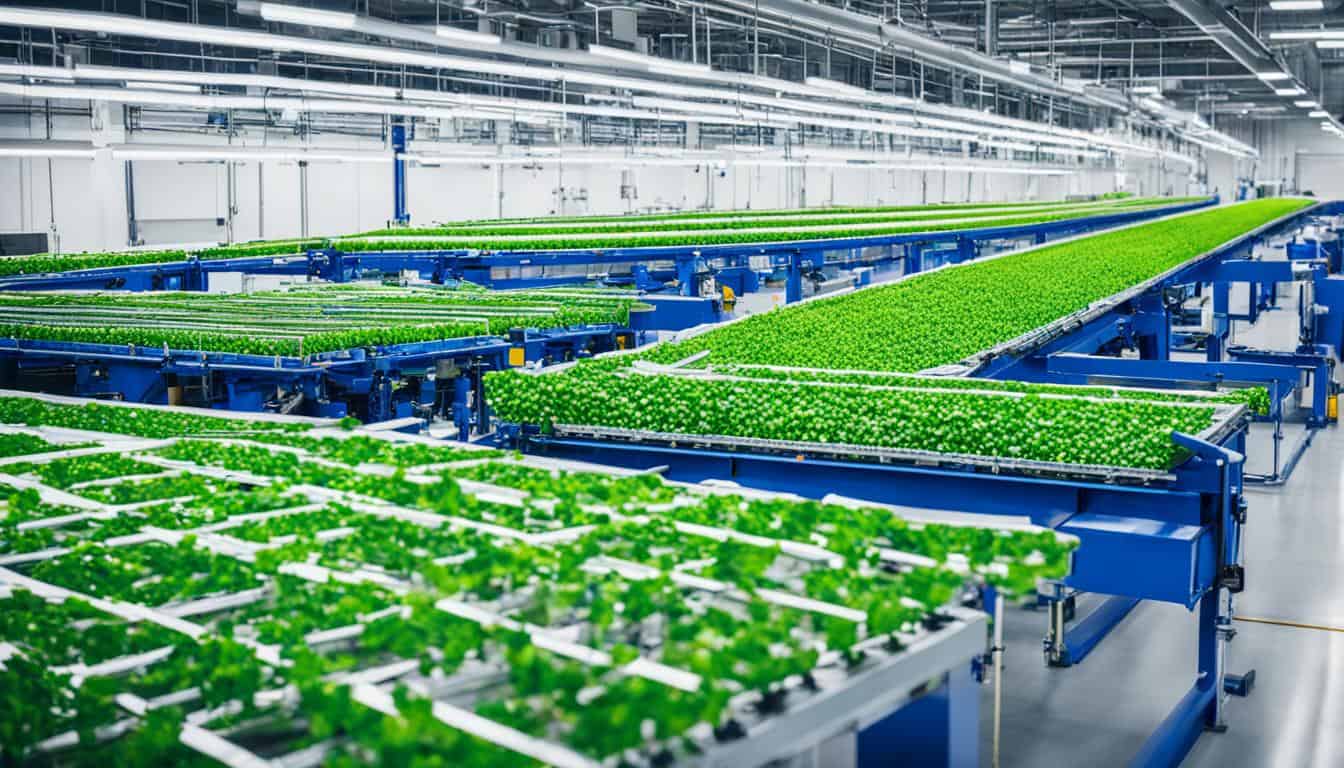
Leave a Reply